Peugeot 408 VS Renault Trafic Transporter – Specs, Efficiency & Price Comparison
Which model is the better choice – the Peugeot 408 or the Renault Trafic Transporter? We compare performance (225 HP vs 170 HP), boot capacity (536 L vs ), efficiency (15.10 kWh1.40 L vs 21.30 kWh6.70 L), and of course, the price (34000 £ vs 29800 £).
Find out now which car fits your needs better!
The Peugeot 408 (SUV) is powered by a Petrol MHEV, Plugin Hybrid or Electric engine and comes with a Automatic transmission. In comparison, the Renault Trafic Transporter (Cargo Van) features a Diesel or Electric engine and a Manuel or Automatic gearbox.
When it comes to boot capacity, the Peugeot 408 offers 536 L, while the Renault Trafic Transporter provides – depending on what matters most to you. If you’re looking for more power, you’ll need to decide whether the 225 HP of the Peugeot 408 or the 170 HP of the Renault Trafic Transporter suits your needs better.
There are also differences in efficiency: 15.10 kWh1.40 L vs 21.30 kWh6.70 L. In terms of price, the Peugeot 408 starts at 34000 £, while the Renault Trafic Transporter is available from 29800 £.
Compare all the key specs now and find out which model fits your lifestyle best!
Peugeot 408
The Peugeot 408 captivates with its sleek and dynamic design, setting it apart in the competitive crossover market. Its interior offers a perfect blend of comfort and cutting-edge technology, creating an enjoyable driving experience. The model's efficient performance and modern features make it a compelling choice for those seeking both style and functionality in their vehicles.
details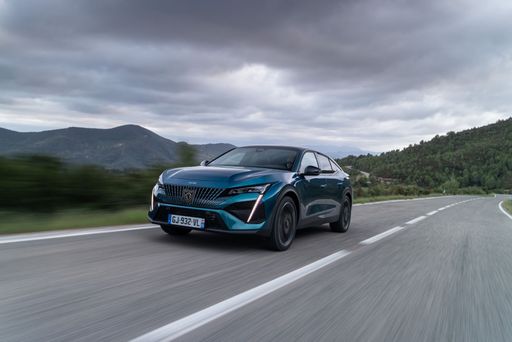 @ media.stellantis.com
@ media.stellantis.com
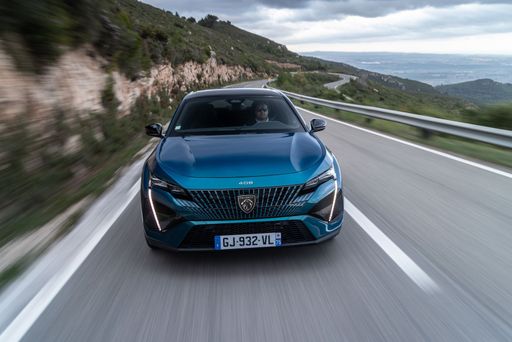 @ media.stellantis.com
@ media.stellantis.com
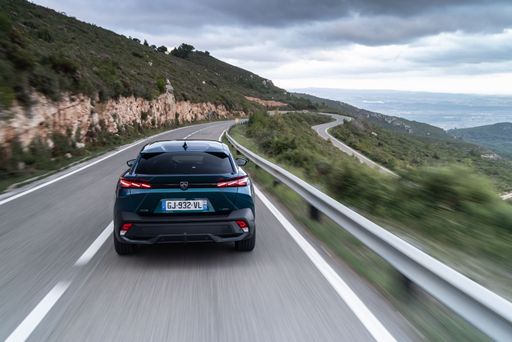 @ media.stellantis.com
@ media.stellantis.com
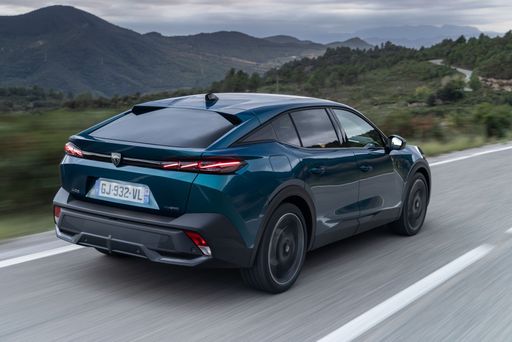 @ media.stellantis.com
@ media.stellantis.com
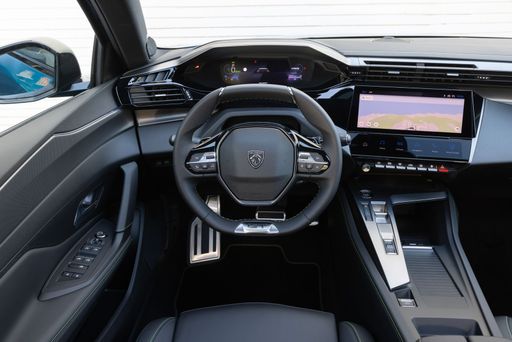 @ media.stellantis.com
@ media.stellantis.com
Renault Trafic Transporter
The Renault Trafic Transporter is a versatile vehicle known for its spacious interior and functional design, ideal for both business and personal use. Its stylish exterior combined with practical features offers a perfect balance between form and function, making it a popular choice among van enthusiasts. The driving experience is enhanced by its smooth handling and advanced technology, providing comfort and convenience for any journey.
details

|
|
|
|
|
Costs and Consumption |
|
|---|---|
|
Price
34000 - 44400 £
|
Price
29800 - 52500 £
|
|
Consumption L/100km
1.4 - 5.1 L
|
Consumption L/100km
6.7 - 7.8 L
|
|
Consumption kWh/100km
15.10 kWh
|
Consumption kWh/100km
21.3 - 21.5 kWh
|
|
Electric Range
55 - 453 km
|
Electric Range
289 - 292 km
|
|
Battery Capacity
11.3 - 58.2 kWh
|
Battery Capacity
-
|
|
co2
0 - 116 g/km
|
co2
0 - 205 g/km
|
|
Fuel tank capacity
40 - 52 L
|
Fuel tank capacity
80 L
|
Dimensions and Body |
|
|---|---|
|
Body Type
SUV
|
Body Type
Cargo Van
|
|
Seats
5
|
Seats
2 - 6
|
|
Doors
5
|
Doors
3 - 4
|
|
Curb weight
1544 - 1879 kg
|
Curb weight
1860 - 2065 kg
|
|
Trunk capacity
471 - 536 L
|
Trunk capacity
-
|
|
Length
4687 mm
|
Length
5080 - 5480 mm
|
|
Width
1848 mm
|
Width
1956 mm
|
|
Height
1478 mm
|
Height
1967 - 2509 mm
|
|
Payload
371 - 456 kg
|
Payload
867 - 1185 kg
|
Engine and Performance |
|
|---|---|
|
Engine Type
Petrol MHEV, Plugin Hybrid, Electric
|
Engine Type
Diesel, Electric
|
|
Transmission
Automatic
|
Transmission
Manuel, Automatic
|
|
Transmission Detail
Dual-Clutch Automatic, Automatic Gearbox, Reduction Gearbox
|
Transmission Detail
Manual Gearbox, Dual-Clutch Automatic, Reduction Gearbox
|
|
Drive Type
Front-Wheel Drive
|
Drive Type
Front-Wheel Drive
|
|
Power HP
136 - 225 HP
|
Power HP
110 - 170 HP
|
|
Acceleration 0-100km/h
7.2 - 11.2 s
|
Acceleration 0-100km/h
10 - 15.1 s
|
|
Max Speed
160 - 233 km/h
|
Max Speed
110 - 185 km/h
|
|
Torque
230 - 360 Nm
|
Torque
245 - 380 Nm
|
|
Number of Cylinders
4
|
Number of Cylinders
4
|
|
Power kW
100 - 165 kW
|
Power kW
81 - 125 kW
|
|
Engine capacity
1199 - 1598 cm3
|
Engine capacity
1997 cm3
|
General |
|
|---|---|
|
Model Year
2023 - 2024
|
Model Year
2022 - 2023
|
|
CO2 Efficiency Class
D, B, A
|
CO2 Efficiency Class
G, A
|
|
Brand
Peugeot
|
Brand
Renault
|
Peugeot 408
The New Lion on the Block: The Peugeot 408
As Peugeot continues to innovate within the SUV segment, the latest iteration of the Peugeot 408 sets new standards in technology, efficiency, and design. With its cutting-edge engineering and innovative features, the Peugeot 408 is more than just a stylish SUV—it's a marvel of modern automotive technology. This article dives into the technical details and innovations that make the Peugeot 408 a highly compelling choice for consumers in the market for a new vehicle.
A Glimpse into the Engine Bay: Performance and Efficiency
The Peugeot 408 comes with a diverse range of powertrains that blend performance and fuel efficiency. Featuring a selection of petrol mild-hybrid, petrol, and plug-in hybrid options, the 408 caters to a variety of driving preferences. The engines have a power output ranging from 131 to 225 PS, ensuring that there's a version suited to both city commutes and highway cruising.
Fuel economy is a significant focus, with consumption figures spanning from an impressive 1.5 L/100km for the plug-in hybrid models to a moderate 6.1 L/100km for the traditional petrol engines. Additionally, the plug-in hybrid versions boast an electric range of up to 55 kilometres, ideal for reducing emissions during shorter journeys.
Ultimate Comfort and Technology in the Cockpit
Peugeot excels in creating interiors that provide both comfort and cutting-edge technology. The 408 doesn't disappoint in this regard. It offers a spacious cabin, accommodating up to five passengers, with high-quality materials and ergonomic designs that enhance the driving experience.
The infotainment system in the Peugeot 408 is state-of-the-art, featuring a responsive touchscreen interface, premium sound options, and seamless connectivity with smartphones. Advanced driver-assistance systems such as adaptive cruise control, lane-keeping assist, and automated emergency braking ensure that journeys are not only comfortable but also safe.
Design Meets Function: Exterior and Practicality
In the realm of exterior design, Peugeot has delivered a striking silhouette with aerodynamic lines and a robust SUV stance. Measuring 4687 mm in length, 1848 mm in width, and 1478 mm in height, the 408 boasts a dynamic presence on the road without compromising on practicality.
Practicality is further enhanced by a generous boot space that ranges from 471 to 536 litres, depending on the model, making it perfect for family trips or weekend getaways. A high payload capacity and thoughtfully designed storage solutions ensure that the Peugeot 408 remains versatile, able to adapt to various lifestyle needs.
Environmental Responsibility and Sustainable Driving
With a keen eye on sustainability, the Peugeot 408 offers an impressive CO2 efficiency rating. The plug-in hybrid versions, in particular, present a substantial reduction in carbon emissions, operating at as low as 33 g/km. This makes the 408 a viable option for environmentally conscious consumers seeking to minimise their carbon footprint.
The automaker's commitment to sustainability does not end at emissions. The materials used in the 408's construction are carefully selected to promote durability and recyclability, ensuring that the vehicle maintains a lower impact on the environment throughout its lifecycle.
Conclusion: The Perfect Blend of Innovation and Tradition
The Peugeot 408 is a remarkable illustration of Peugeot's ability to blend traditional automotive values with the latest technological advancements. Its innovative powertrains, luxurious interiors, and forward-thinking design make it a formidable contender in the competitive SUV market. Whether you prioritise fuel economy, driving performance, or cutting-edge technology, the Peugeot 408 is poised to meet and exceed expectations. As Peugeot advances into the future, the 408 leads the charge as a testament to the brand's relentless pursuit of excellence.
Renault Trafic Transporter
The Renault Trafic Transporter: A Modern Workhorse Unveiled
Renault has consistently set benchmarks in the world of commercial vehicles, and the Renault Trafic Transporter stands as a testament to its innovation and engineering prowess. With a robust design and a variety of configurations, this model addresses the diverse needs of modern businesses. Let’s delve into the technical details and innovative features that make the Renault Trafic Transporter a standout choice in its segment.
Power and Performance
The Renault Trafic Transporter is powered by a choice of 2.0-litre diesel engines boasting power outputs ranging from 110 to 170 PS (81 to 125 kW). The torque delivery is impressive, with figures ranging from 245 to 380 Nm, ensuring ample pulling power for heavy loads. For those seeking an environmentally friendlier option, Renault offers the Trafic with a 100% electric motor delivering 122 PS, a noteworthy addition to its line-up.
Efficient Fuel Consumption
When it comes to fuel efficiency, the diesel variants of the Renault Trafic maintain a commendable consumption range of 6.7 to 7.8 litres per 100 km. Meanwhile, the electric model showcases a consumption of 21.3 kWh per 100 km, with an electric range that stretches up to 292 km. This efficiency places it favourably within the CO2 efficiency classes from A to G.
Robust and Versatile Design
Versatility is at the heart of the Renault Trafic Transporter’s design ethos. With a wide range of body styles available, including options for an extended height or length, businesses can tailor the vehicle to meet their specific transport requirements. The vehicle offers configurations supporting 3 to 4 doors and a payload capacity that ranges from 867 to 1185 kg, ensuring adaptability to a broad spectrum of logistical challenges.
Advanced Features and Innovation
Inside, the Renault Trafic Transporter features a driver-focused cockpit, equipped with modern conveniences such as a multifunction steering wheel and an intuitive dashboard. The available Ecoline, Komfort, and Komfort EDC equipment lines offer varying levels of comfort and technology, ensuring a fit for every budget and preference.
Safety and Connectivity
Renault has prioritised safety in the Trafic Transporter, equipping it with advanced driver assistance systems and connectivity features to keep drivers connected and secure on the road. These innovations not only enhance the driving experience but also contribute to safer business operations.
Conclusion: A Smart Investment for Businesses
With its variety in configurations, impressive powertrains, and focus on efficiency, the Renault Trafic Transporter emerges as a leading choice for businesses nationwide. Whether navigating urban deliveries or long-distance hauls, this transporter provides the reliability and customization that modern enterprises demand, making it an investment well worth considering.
The prices and data displayed are estimates based on German list prices and may vary by country. This information is not legally binding.
